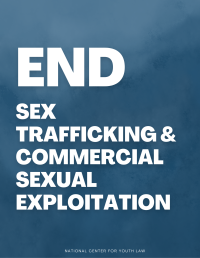L.A. County Launches Innovative Model for Serving Commercially Sexually Exploited Youth
FOR IMMEDIATE RELEASE
March 14, 2019
Contact: Kate Walker Brown, [email protected]
LOS ANGELES, CA – Los Angeles County is launching a new, interagency protocol to improve efforts to proactively identify and serve exploited youth who come into contact with the juvenile justice system. The Detention Interagency Identification and Response Protocol for Commercially Sexually Exploited Children and Youth is the result of a strong, collaborative partnership between the Probation Department, the Departments of Children and Family Services, Health Services, Mental Health, and Public Health, the Office of Education, and the National Center for Youth Law and builds on the County’s expansive work and initiatives to support children and youth who have been commercially sexually exploited (CSE).
“While our County has long recognized that children and youth who have been commercially sexually exploited are victims of child abuse and should not be criminalized for what they have experienced, unfortunately they often still end up in contact with the juvenile justice system, for issues both related and unrelated to their exploitation,” says Michelle Guymon, Director of the L.A County Probation Department’s Child Trafficking Unit. “This protocol recognizes that when these youth do come into our custody and care, it is our responsibility and duty to identify that they have been exploited, report the exploitation as child abuse, build trusting relationships with the young person, and work collaboratively across multiple agencies to support them in meeting their myriad needs while also building on their strengths and cultivating their goals and aspirations.” The Protocol also prioritizes connecting youth with services and supports in the community to smooth the transition from detention facilities.
“Because you never know who a young person will connect with, a crucial piece of this puzzle was making sure that staff members from all agencies that work within detention facilities - probation, child welfare, health and mental health services, education - understand the issue and are on the same page in terms of their commitment to supporting youth who experience CSE,” says Kate Walker Brown, Director of the National Center for Youth Law’s Collaborative Responses to Commercial Sexual Exploitation Initiative. “Opening lines of communication and encouraging the development of relationships between young people and the adults in detention can be pivotal in altering the trajectory of a youth’s life.”
This new collaborative, service-based approach, which has begun to be rolled out in the County’s three juvenile halls, has already produced results. The data so far shows of the 526 youth who have disclosed exploitation in the halls, about 41% of them disclosed to Probation staff, 32% disclosed to health care staff, and 26% disclosed to mental health staff. Whoever youth disclose to, the Protocol ensures that staff will address any urgent medical or mental health care needs -- such as emergency reproductive health care -- as well as other necessary services in a timely fashion.
Youth are seeing the benefits of the collaborative approach: “When I first got locked up and I went to see the nurse, she was asking me all kinds of questions. Like some personal questions. I didn’t answer her at first, but then she acted like she really cared so I told her about what was happening to me,” said one youth. “She said she would have someone else come talk to me about having an advocate and other services. When the probation officer came to talk to me I was like, why are you here, but she ended up being really cool and supportive. What made it different is that after I talked to the nurse I got support really quick. I liked that.“
As the County moved away from arresting children and youth for prostitution (a change which went into California law in 2016 with SB 1322), and awareness about CSE has grown among both staff and youth through extensive training, there has been a dramatic increase in the number of youth who feel comfortable disclosing their exploitation while in juvenile hall, such as boys, young men, trans youth, and gender non-conforming youth, who have traditionally been under-identified. For example, while more than 99% of the youth identified through the County’s Law Enforcement First Responder Protocol have been girls or young women, the Detention Protocol has identified 37 boys and young men and 12 transgender youth, representing 9% of the 526 youth identified in detention.
“The Detention Interagency Protocol represents yet another way L.A. County is leading the charge within California and nationally to move away from blaming and criminalizing youth for their exploitation and instead serving them in holistic, trauma-informed ways,” said L.A. Supervisor Mark Ridley-Thomas. “Knowing that so many young people do not feel safe disclosing their histories of abuse until they are in the County’s detention facilities is a wakeup call to us all that we must be more cognizant to what a child’s early cries for help look like in our homes, our schools, and our communities.”










